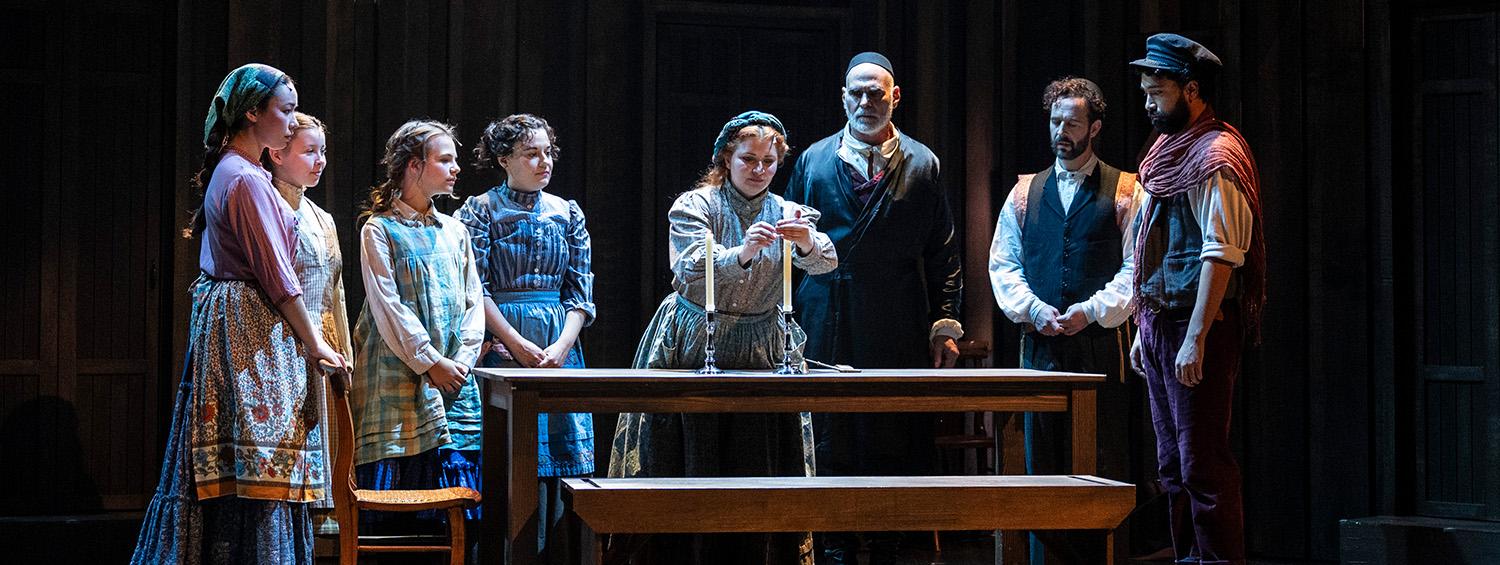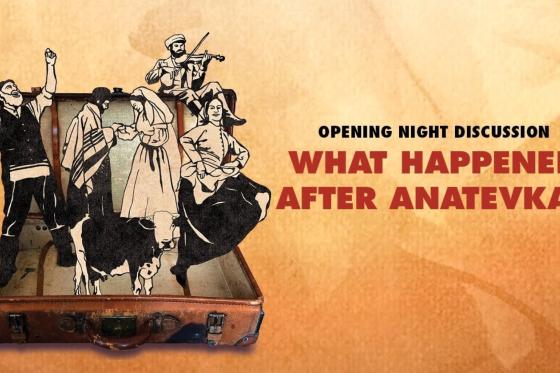For both Jewish and non-Jewish audiences, Fiddler on the Roof is one of the most recognizable representations of Jewish traditions, life in the shtetls (Eastern European market towns with a high Jewish population), and the Eastern European Jewish experience in the early 20th century. But when the show was first being created in the 1960s, the Jewish creative team had to be specific about how they presented Judaism and shtetl life to audiences.
Book writer Joseph Stein, composer Jerry Bock, and lyricist Sheldon Harnick first started meeting about adapting Sholem Aleichem’s Tevye stories into a musical in 1961. There were eight of these stories in the translated volume, and initially, the writers were going to work from five of them: “Modern Children” (the story that focuses on Tzeitel’s marriage to Motel the tailor), “Hodel” (the daughter who chooses Perchik, the revolutionary, and follows him to Siberia), “Chava” (the one who marries a non-Jew), “Shprintze” (who drowns herself after her wealthy lover’s uncle calls off their betrothal), and “Get Thee Out” (in which Tevye and his family are evicted from their town). Early on in writing the show, they cut the story about Shprintze because it would make the show too dark and too long.
Making these stories work for the stage and accessible for a twentieth-century American audience proved to be one of Joseph Stein’s biggest challenges. He believed that most of Sholem Aleichem’s words and dialogue were unusable for a theatrical setting, since they did not have much action. For example, the wedding between Motel and Tzeitel is a throwaway line in the original story, so Stein ended up creating the elaborate wedding sequence himself. The idea of Tevye talking one-on-one with God did originate from the Sholem Aleichem stories, but Stein tweaked it to have Tevye break the fourth wall. Another change Stein made was through the character of Yente. Stein transformed a male matchmaker named Efrayim from Aleichem’s “Tevye Leaves for the Land of Israel” into the comedic busybody trope that was recognizable and had an American Jewish sensibility. The authors had vowed to avoid the Yiddish language in the script because they felt it was associated with cheap plays for laughs, but Yente had come into the general lexicon as a meddling gossip, so Stein allowed it.
From the early stages of writing, to rehearsal, and to the out-of-town tryouts in Detroit and Washington D.C., Bock and Harnick wrote 50 songs for the show (about one third of those stayed in the show). The first song they wrote was “The Dream,” but it wasn’t until they shared “Sunrise, Sunset” with Bock’s wife and Harnick’s sister and brought them both to tears that they knew they had a show that could be great.
When the show was finally ready to be sent to producers, the writers were frequently turned down. As Joseph Stein recalled, “We were turned down by everybody because everyone thought it wouldn’t have popular appeal. It was too ethnic, and ‘ethnic’ was a code word for ‘Jewish.’” Producers’ concerns were backed in part by the fact that Jewish audiences were coming in low numbers to Broadway for shows that were deemed nostalgic representations of Judaism, especially as these audiences were leaving the Lower East Side and their Jewish communities. Funny Girl was still popular with them despite this, because it was not this nostalgic presentation of Jewishness that they were avoiding.
Even once producer Hal Prince and director/choreographer Jerome Robbins joined the project in 1963 and the show was headed towards Broadway, the concerns about the Jewishness of the show remained. When producers were looking for investors for the show, they made no specific effort to look for Jewish investors, and the words “Jew,” “Jewish,” “Yiddish,” and “shtetl” were not in the description that was sent. In addition, Robbins and the writers wanted to avoid casting someone whose performance was stereotypically Jewish, or a “stage Jew” (but they did audition some Yiddish performers from the Hebrew Actors’ Union). Robbins wanted the universality of the script to come through in Tevye’s battle between keeping to tradition and following his heart. One note he gave to Stein during pre-production was that the script was “still terribly anti-Gentile and Jewish self-loving.” Once Robbins and the writers shifted the focus to tradition, they wrote a whole new opening number, replacing the very Jewish “We’ve Never Missed a Sabbath Yet” with the now-iconic song, “Tradition.”
Some of the very specific Jewish moments in the piece come from Zero Mostel, the original Tevye. During the rehearsal process, Mostel and Robbins often argued about Jewish elements of the show. One of the more notable moments was over Mostel incorporating the kissing of the mezuzah (a scroll with Hebrew verses often hung on doorways) into the show; Robbins wanted him to stop doing it, but Mostel recognized how important it would be to Tevye and the people of Anatevka. He won the argument and the kissing of the mezuzah stayed in the show. For the nonsense syllables in “If I Were a Rich Man,” Harnick had been inspired by a performance by the Hebrew Actors’ Union and tried to replicate the syllables they sang in the lyrics. Zero Mostel tweaked this into Yiddish scat syllables that were half-hummed, half-sung.
All of the meticulous changes and the work that went into Fiddler on the Roof clearly paid off. The legacy of the musical is undeniable: it has had multiple revivals on Broadway and on London’s West End, as well as multiple international productions and countless school, community theatre, and regional theatre productions. Both the universality of its themes, and the Jewishness of the piece are still treasured by audiences today. As Alisa Solomon writes in her book Wonder of Wonders: A Cultural History of Fiddler on the Roof: “The show offered itself as a means of self-affirmation—one that didn’t require abandoning, and in fact celebrated, those pro-equality ‘pieties.’ Attending the play, purchasing the original cast album, and singing its songs became a form of ethnic assertion.”
Box Office: 301.924.3400
Open Wednesday - Sunday: 12:00 PM - 6:00 PM






